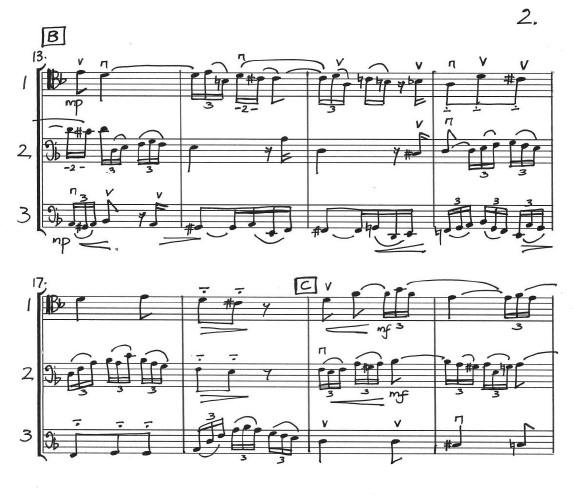BACH Wilhelm Friedemann – Fugue in D Minor – THREE CELLOS
- September 3, 2017
- 0 comments
- daib0

2,50€
Available in download/s with price: €2.50
The order is possible by credit card (minimum purchase €4.00) or by PayPal (minimum purchase €4.50)
There are generous discounts for larger orders (see information in the right column)
Please try not to enter more than a single copy of each work (with the quantity set to “1“, you already have 4 opportunities to download the requested PDFs, during a period of 7 days)
In each check-out the web shop can also include up to THREE free products together with your order (indicated with a price of €0.00) at your free choice!
In general, the most detailed descriptive information about the music offered is found in the English version of the website.
Enjoy the music!
Description
BACH, Wilhem Friedemann (1710-1784) – Fugue in D minor
prepared by David Johnstone for Three Cellos
PDF 1 – General Score
PDF 2 – All Individual Parts
..
The tempo indication is: Andante mesto
General difficulty of the music – other brief Information: MEDIUM difficulty
EXAMPLE:

Any known possible links of this music (audio, video, article etc.) –
P.S. If you ever record this music (preferably onto YouTube) we would be delighted to add YOUR link here and in the Audio-Video section of the Web – which might also be good publicity for yourselves!
Enjoy the music !!
Notes on the composer:
Wilhelm Friedemann Bach, (born Nov. 22, 1710, Weimar, Saxe-Weimar—died July 1, 1784, Berlin), eldest son of J.S. and Maria Barbara Bach, was a German composer during the period of transition between Baroque and Rococo styles.
W.F. Bach’s musical instruction was primarily from his father (who wrote for him, when he was ten, the charming Klavier-büchlein vor Wilhelm Friedemann Bach of keyboard pieces). He also studied the violin. He matriculated at Leipzig University in 1729.
In 1733, already composing extensively, he was appointed organist to the Church of St. Sophia in Dresden. In 1746 he moved to the Liebfrauenkirche at Halle. At about this time, or perhaps later, after his father’s death in 1750, he seemed to begin to have personality difficulties, evidenced by excessive drinking and other lapses. After a late marriage in 1751, to Dorothea Elisabeth Georgi,
he became restless and applied for a change of post in 1753 and 1758 (but both were unsuccessful). In 1762 he won an appointment to the Darmstadt court but did not take it up. Resigning his old post in Halle in 1764, for 20 years he sought in vain for regular employment. He became touchy and unreliable, and although his talents were never doubted, he imagined that they were. However, he did not use his talent to the full. He was a very good improviser, but was considered somewhat careless when playing music by other composers, even including his father’s! In 1774 he moved to Berlin, where he lived only meagerly by giving recitals and teaching.
Of his compositions, keyboard works and cantatas form the larger part; he also composed several symphonies and chamber works and an opera. His music vacillated between the Baroque style of his father and the newer ‘galant’ and ‘Rococo’ styles. His compositions are often impassioned, and unpredictable in their use of melody, harmony, and rhythm. The late keyboard works follow new stylistic ideals. There is a noticeable tendency towards formal, technical and melodic clarity in the sonatas, while some of the virtuoso fantasias anticipate 19th-century keyboard techniques. At the same time Bach obviously had a predilection for older forms such as the toccata and fugue. Although Friedemann Bach’s work is a little bit more limited in both quantity and stylistic variety than the music of his brother Carl Philipp Emanuel, he must be ranked beside C.P.E. Bach as one of the major composers representing the period between Baroque and Classical composition. Only a few of Bach’s works were at all widely known in his lifetime.
Welcome to Johnstone-Music! A big Anglo-Spanish web for MUSICIANS and especially CELLISTS – original music scores for orchestral instruments and keyboard. Plus articles, audios, videos, resources, catalogues, news etc. Official web of the professional cellist David Johnstone, principal cello Navarre Symphony Orchestra (Spain), chamber musician and soloist in many premieres. Hundreds of cello arrangements in the web for a symbolic charge per download or for free.
The following have taken his work onboard, sometimes with special collaborations as composer-arranger-performer: the Philadelphia Orchestra, Orquesta Sinfónica de Euskadi, Orquesta Sinfónica de Venezuela, Orchestre Nouvelle Generation de Montreal, the Gulbenkian Orchestra (Lisbon), Orchestra da Camera del Locarnese (Suiza), The Zagreb Soloists, the Saint Petersburg Musical Theatre “Zazerkalye” Chamber Orchestra, the Wroclaw Chamber Orchestra Leopoldinum (Poland), Auckland Philharmonic Orchestra (New Zealand), Camerata Cambrensis (Basque country), Essener Philharmoniker (Germany), Ensemble Metamorphosis of Belgrade (Serbia), with Ara Malikian (Non Profit Music Chamber Orchestra – Madrid), and a long etc.. Currently, many courses, conservatoires and music schools, university String departments etc. use his repertoire; there are dozens of his arrangements on ‘You Tube’ …
Directly from the home page visit our sections:
** PHOTOS OF CELLO ENSEMBLES WORLD-WIDE PERFORMING SCORES FROM JOHNSTONE-MUSIC
** WHO PLAYS JOHNSTONE-MUSIC? – SEE EXTENSIVE LIST OF ORCHESTRAS, ORGANIZATIONS, EVENTS
.
.
.
Cellos Music Partituras gratis precio simbólico free symbolic price
Related products
-

Johnstone’s Titanic “Rose” Fantasy-Sonatina – JOHNSTONE/HORNER – 3 SOLO CELLOS
3,50€ Add to cart -

COUPERIN – Pieces en Concert – THREE CELLOS
3,50€ Add to cart -

BART – MINIATURE SONG – Where is Love? (from the Musical ‘Oliver’) – THREE CELLOS
2,50€ Add to cart -

Alegria de Navarra – Johnstone – THREE CELLOS or larger cello ensemble
3,00€ Add to cart







